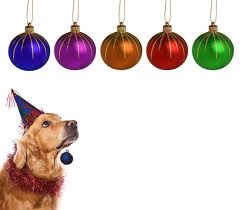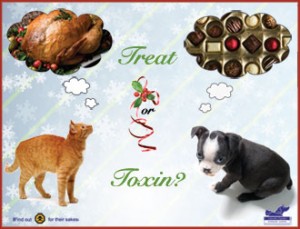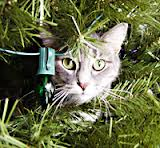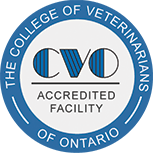
Here are some tips for keeping your pets out of danger during the holiday season.
AVOID Holiday Food Items That Could Cause Problems For Your Pet
- Alcoholic beverages
- Chocolate (baker’s, semi-sweet, milk chocolate)
- Coffee (grounds, beans, chocolate covered espresso beans)
- Moldy or spoiled foods
- Onions, onion powder
- Fatty foods
- Salt
- Yeast dough
PLANTS
- Lilies that may be found in holiday flower arrangements could be deadly to your cat. Many types of lily, such as Tiger, Asian, Japanese Show, Easter, Stargazer, and the Casa Blanca, can cause kidney failure in cats.
- Poinsettias are generally over-rated in toxicity. If ingested, poinsettias can be irritating to the mouth and stomach, and may cause mild vomiting or nausea.
- Mistletoe has the potential to cause cardiovascular problems. However, mistletoe ingestion usually only causes gastrointestinal upset.
- Holly ingestion could cause vomiting, nausea, diarrhea, and lethargy.
HAZARDS AROUND THE CHRISTMAS TREE
- Christmas tree water may contain fertilizers, which, if ingested, can cause stomach upset. Stagnant tree water can be breeding grounds for bacteria, which can also lead to vomiting, nausea, and diarrhea, if ingested.
- Electric cords– Avoid animal exposure to electric cords. If they were chewed, they could electrocute your pet. Cover up or hide electric cords, never let your pet chew on them.
- Ribbons or tinsel can get caught up in the intestines and cause intestinal obstruction.
- Batteries contain corrosives. If ingested they can cause ulceration to the mouth, tongue, and the rest of the gastrointestinal tract.
- Glass ornaments can cut the tissues of the gastrointestinal tract if ingested.
- Potpourris are popular household fragrances commonly used during the holiday season. Pets are often exposed to liquid potpourri by direct ingestion from simmer pots or spills, or by rubbing against leaky bottles or simmer pots containing the potpourri, or from spilling the containers upon themselves. Oral exposures result following grooming. Exposure of pets to some types of liquid potpourris can result in severe oral, dermal, and ocular damage. Dry potpourri generally doesn’t cause those issues, but there may be problems due to foreign body and (possibly) toxic plant ingestion.

OTHER WINTER HAZARDS
- Antifreeze has a pleasant taste. Unfortunately, very small amounts can be lethal. As little as one teaspoon of antifreeze can be deadly to a cat; less than four teaspoons can be dangerous to a 10-pound dog. Thoroughly clean up any spills, store antifreeze in tightly closed containers and store in secured cabinets. Automotive products such as gasoline, oil and antifreeze should be stored in areas that are inaccessible to your pets.
- If you think your pet has consumed antifreeze, contact your veterinarian or the ASPCA Animal Poison Control Center (1-888-4-ANI-HELP) right away!
- Ice melting products can be irritating to skin and mouth. Depending on the actual ingredient of the ice melt and the quantity, signs of ingestion would include excessive drooling, depression, vomiting or even electrolyte imbalances.
- Rat and mouse killers are used more commonly during colder weather. When using rat and mouse bait, place the products in areas that are inaccessible to your companion animals.
ALWAYS Be Prepared !!!!
Your animal may become poisoned in spite of your best efforts to prevent it. You should keep telephone numbers for Valley Vet (613-257-3202), a local emergency veterinary service (613-729-6139 Ottawa Vet), and the ASPCA Animal Poison Control Center (1-888-4 ANI-HELP) in a convenient location. If you suspect that your pet has ingested something poisonous, seek medical attention immediately.
ASPCA Animal Poison Control Center
1-888-4ANI-HELP
http://www.apcc.aspca.org
Valley Vet on-call
613-257-3202
www.valleyvet.ca – check out the sick pet helper on the website
24 emergency clinic – Ottawa Veterinary Hospital
613-729-6139


